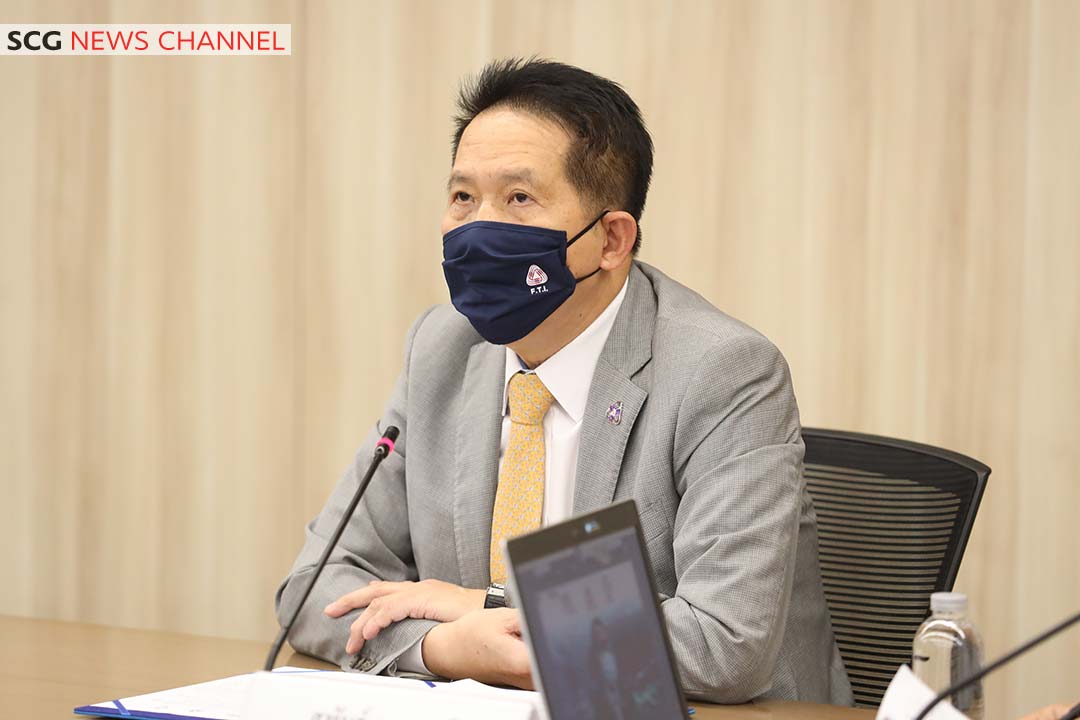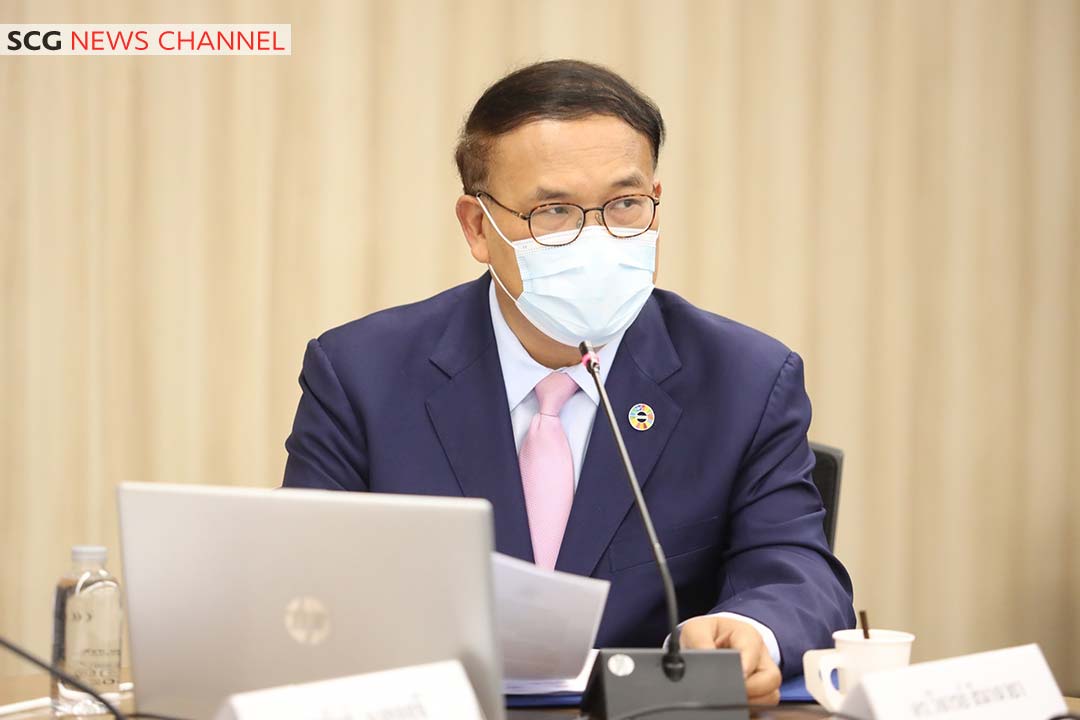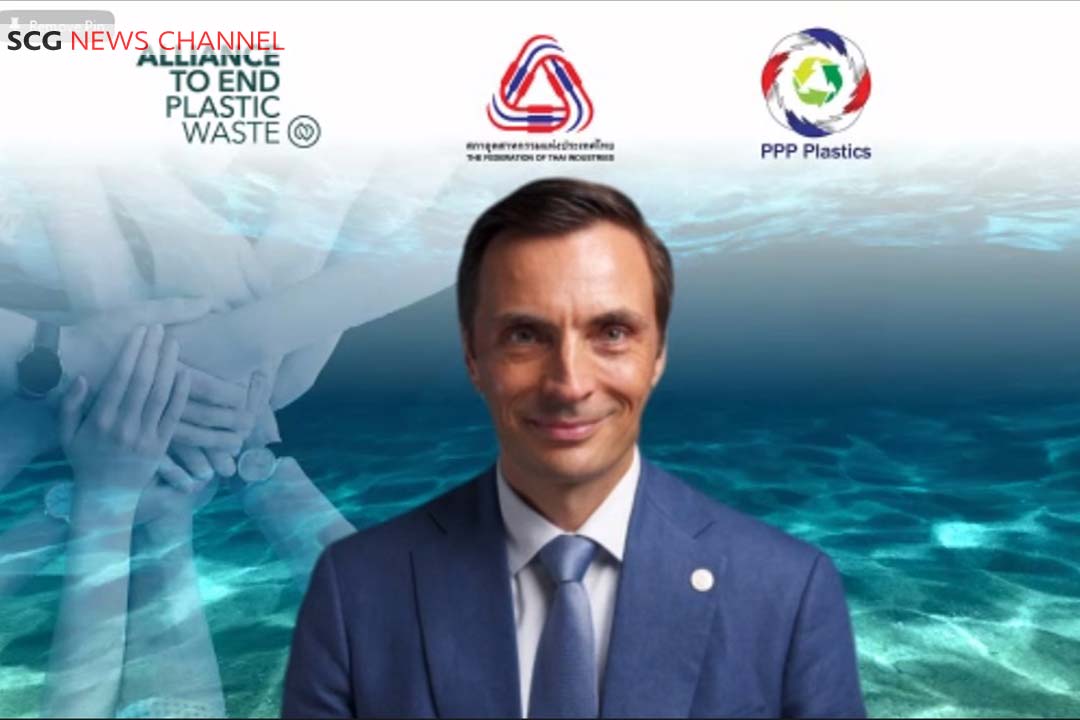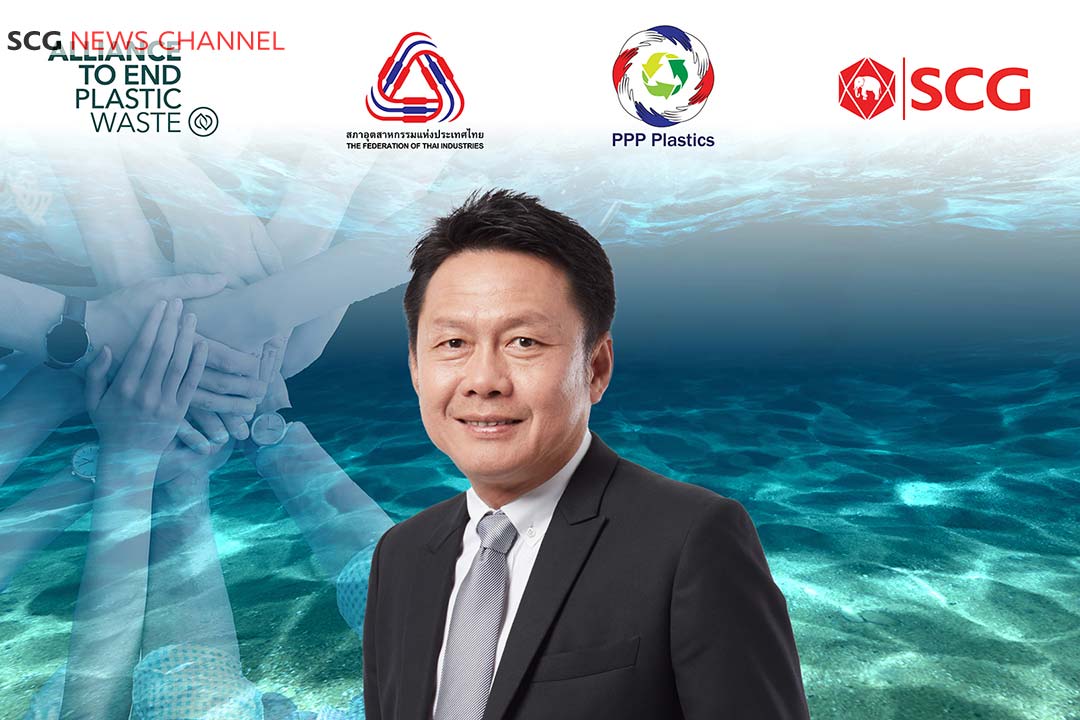The Federation of Thai Industries, PPP Plastics and the Alliance to End Plastic waste (AEPW) jointly launched the ALL_Thailand project for sustainable plastic management with Mr. Supant Mongkolsuthree, Chairman, The Federation of Thai Industries, Dr. Wijarn Simachaya, Chairman, Thailand PPP Plastics, and Mr. Jacob Duer, President and CEO, Alliance to End Plastic Waste: AEPW, presided over the ceremony with executives from the main sponsors of PPP Plastics, namely Dow Thailand Group, SCG, PTT Global Chemical Public Company Limited, Nestle (Thailand) Co., Ltd., and SUEZ.
The ALL_Thailand project aims to develop prototypes and innovations in reusing used plastics and preventing those plastics from leaking into the environment by emphasizing on the creation of management prototypes at the source from community, local, and provinces levels of every lifestyle to systems, as well as the creation of innovations that will help bring those plastics back to use in accordance with the circular economy principle effectively which when the project is completed, then will require further expansion of the national governments have to provide results to cover in accordance with the government’s BCG policy and the plastic waste management roadmap of Thailand. The 3 projects are as follows: Eco Digiclean Klongtoei Project, Rayong Less-Waste Project, and Paving Green Roads Project with a total operating period of 2 years.

Mr Supant Mongkolsuthree, Chairman, The Federation of Thai Industries, said, The Federation of Thai Industries (FTI) has focused on the sustainable management of plastic waste in Thailand. We collaborate with the Alliance to End Plastic Waste (AEPW) and PPP Plastics to create a business model in waste management that can be widely expanded to benefit society, the environment, and the economy. FTI is well prepared to implement the projects to promote a comprehensive waste management model and create added value to plastic waste. For example, plastic waste can be used for road construction, a key infrastructure of the country. In addition, it can create Thailand’s guidelines for plastic waste management throughout the supply chain according to the guidelines for the development of the Bio-Circular-Green Economic: BCG Model and enhance the competitiveness of the Thai industrial sector following economic and technological development trends in the future.

Dr Wijarn Simachaya, Chairman, Thailand PPP Plastics, said, “The ALL Thailand project consists of 3 projects: 1. A pilot project to develop plastic waste management in major cities or Eco Digiclean Klongtoei. It focuses on applying digital technology to help manage the plastic waste at the source, such as creating an application to help manage waste, developing a new semi-automatic bin to help separate plastic waste and creating a traceability system to add value to plastic waste, as well as research & development of a system for recycling used plastics to meet the demands of people with different lifestyles in order to attract more plastics back into the recycling system. 2. The “Rayong Less–Waste” or “Rayong Reduce Waste” project aimed to expand the community and local waste management model with a circular economy in Rayong Province by transferring knowledge to create knowledge and understanding of waste management to cover all 68 municipalities of Rayong Province, and to generate income, a career, good quality of life and reduce the amount of plastic waste that goes to landfills in Rayong which it is counting the days to have less area. 3. Paving Green Roads Project, It is a study on how to use plastic waste as part of building asphalt roads with efficiency and no environmental impact which jointly implement with many countries. In Thailand, we have worked with a team of experts from Chiang Mai University to jointly the environmental research of road construction that contains plastic waste in terms of air and water, including strength and durability properties, and the potential to recycle demolished plastic roads in order to be appropriate option to build Thailand’s new roads in the future”

Mr Jacob Duer, President and CEO of the Alliance to End Plastic Waste, said: “These three projects are each unique examples of the action happening on the ground. When combined through the ALL_Thailand programme, they demonstrate how collaboration can help to amplify individual efforts – to enable knowledge sharing, empower education and drive positive impact for communities. This is in line with the vision of the Alliance to catalyse collective action to advance a circular economy and end plastic waste in the environment.”
Mr Kriengkrai Thiennukul, Vice Chaiman, The Federation of Thai Industries, said,the Industrial Promotion and Support Department focused on plastic waste management and is ready to act as a representative in order to encourage relevant business sectors to discuss the establishment of a standard for plastic PET bottles from colored to clear recycled bottles , including to promote the reuse of recycled plastic bottles, and create value by collection of more used plastic bottles into the recycling system in accordance with the future technology direction and the Bio-Circular-Green Economy (BCG Model).
Mr Chatchai Luanpolcharoenchai, President, Dow Thailand Group,said, “We see the benefits of working with all sectors to manage used plastic sustainably. We are one of the founding members of PPP Plastics since 2017 and have driven various projects under PPP Plastics, including the ALL_Thailand project to drive plastic circularity. We are willing to support this project and work with all stakeholders for the success of the ALL_Thailand, which will bring many benefits the country.”

Mr Sakchai Patiparnpreechavud, Vice President, Chemicals Business, SCG, said “Chemical Business, SCG is conducting business with the 2021 direction toward a “Chemicals Business for Sustainability,” aligning our strategies and practices with the ESG and SDGs. Given rising concerns around the realities of inappropriately managed plastic waste, we have thus adopted circular economy and integrated the restorative approach into our business operations, focusing on thorough management cycle of plastics with a strong sense of care and responsibility. These perspectives have been illustrated in three disciplinary ways: (1) Building a better awareness and understanding of circularity that leads to cultivating eco-consciousness in target audience and ultimately changing their undesired behaviour for sustainably-intended and at-source waste management practices. According to a green mindset of “Resource Maximization, Correct Sorting, Proper Disposal,” the SCG-endorsed way of waste management and disposal can start at home. Children, while in schools, are to sensitize environmental stewardship through waste-free lessons and activities, empowering them to be role models and mentors in waste management and disposal for society. To accommodate waste management activities and recover more of the valuable materials present in waste streams, SCG is also at the forefront of the effectively digitized waste management regimes — our waste bank management application “KoomKah” helps streamline waste management at fingertips. (2) Integrating circular economy principles into our business model is another key practice that SCG has adopted. We are committed to groundbreaking solutions that exceeds customer needs and wants, and more importantly, they are ecologically sound and recycling-driven. (3) Accelerating networks and collaborations spans across the country and overseas plays the last role in SCG’s environmental stewardship. We believe that collaborative efforts among organizations at all levels and territories — particularly AEPW, PPP Plastics and its alliances — are significantly important to safeguarding well-being and building sustainable growth for our stakeholders.
Dr Chaya Chandavasu, Senior Vice President, Sustainability and Corporate Branding, PTT Global Chemical Public Company Limited, said, “GC, one of the founders of PPP Plastics, is pleased that PPP Plastics and the Federation of Thai Industries are joining with the Alliance to End Plastic Waste, or AEPW in solving the plastic waste problem through sustainable waste management and solutions in line with the principles of the Circular Economy and the 3Rs. GC recognizes the problems caused by plastic waste. To respond, we have adopted innovations and technologies to develop various alternative solutions for consumers. GC is ready to provide support in education, research and development, and innovation to maximize the value of plastic waste, in accordance with BCG’s guidelines, to elevate people’s well-being and increase the competitiveness of the Thai industrial sector. GC strongly believes that the cooperation with PPP Plastics and its partners will drive more systematic management of used plastics resulting in projects that are capable of achieving their objectives in reducing the amount of plastic waste in Thailand’s seas by at least 50% by 2027.”
Mr. Nophadol Siwabutr, Director for Corporate Affairs, Nestlé (Thai) Ltd., said, “The plastic waste problem is an immense environmental challenge for all of us. As the world’s largest food and beverage company, Nestlé recognizes our role as a manufacturer in addressing this challenge and we are committed to reducing our environmental impact and helping to find a solution for a waste-free future. Nestlé has changed our packaging materials to be recyclable or reusable. We also place great importance on collaborations with all relevant parties and support the development of an efficient plastic waste management system for Thailand so we can become a full-fledged circular economy as soon as possible.”
Mr Stephane Heddesheimer, CEO of Recycling & Recovery, SUEZ Asia, said: “Plastic recycling has an essential role to play in accelerating the Kingdom’s Bio-Circular-Green Economy and its vision to transit into a low-carbon future. SUEZ is dedicated to recycling plastic and turning waste into energy for Thailand, and we continue to join hands with The Federation of Thai Industries, PPP Plastics and the Alliance to End Plastic waste as well as other industrial leaders across the value chain in achieving a noble goal. I am convinced that our cooperation will bring a positive impact on our environment, our biodiversity, and our community.”
Published on: Jun 16, 2021
 ดาวน์โหลดข่าว
ดาวน์โหลดข่าว